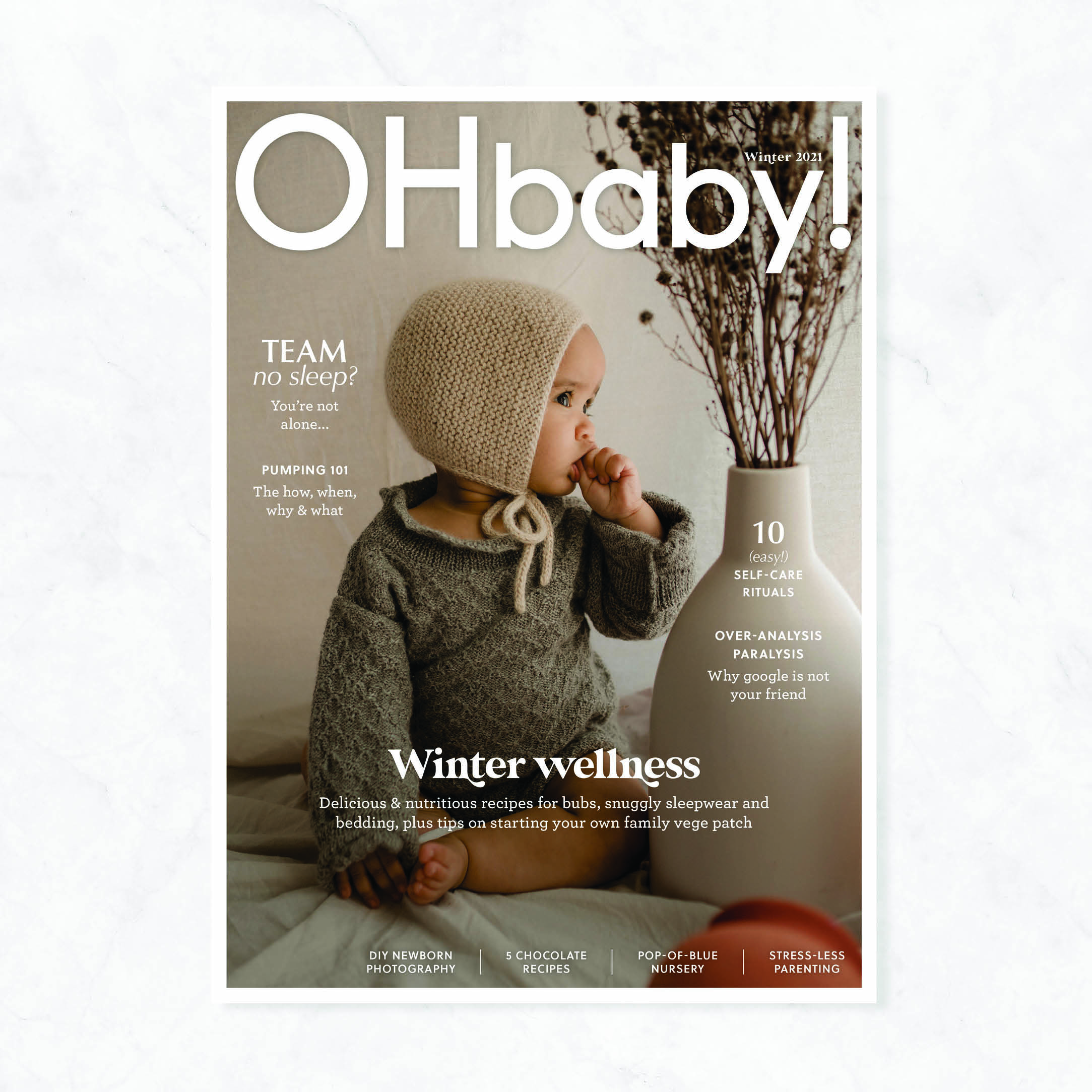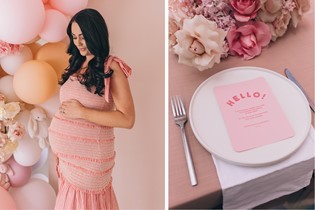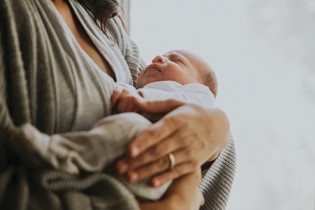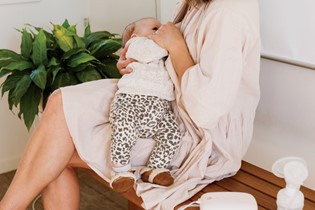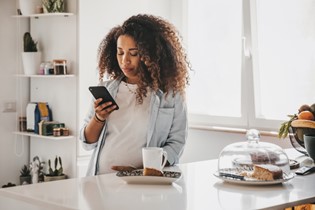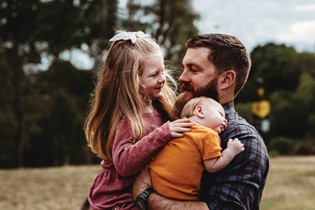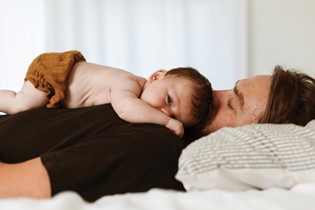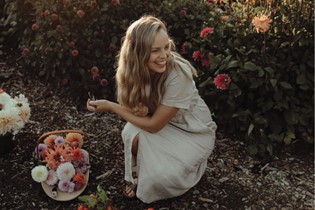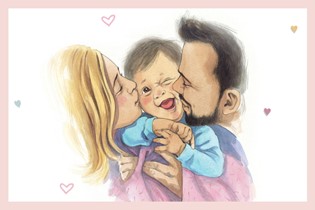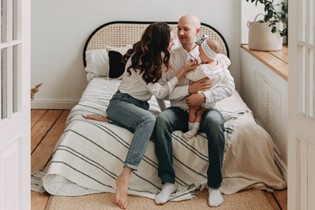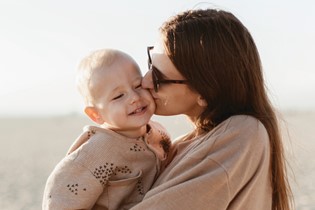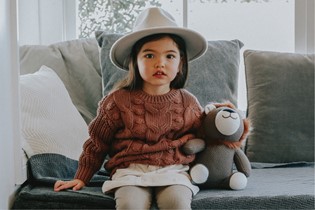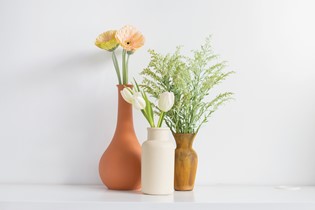Could co-parenting be the perfect parenting model for you?
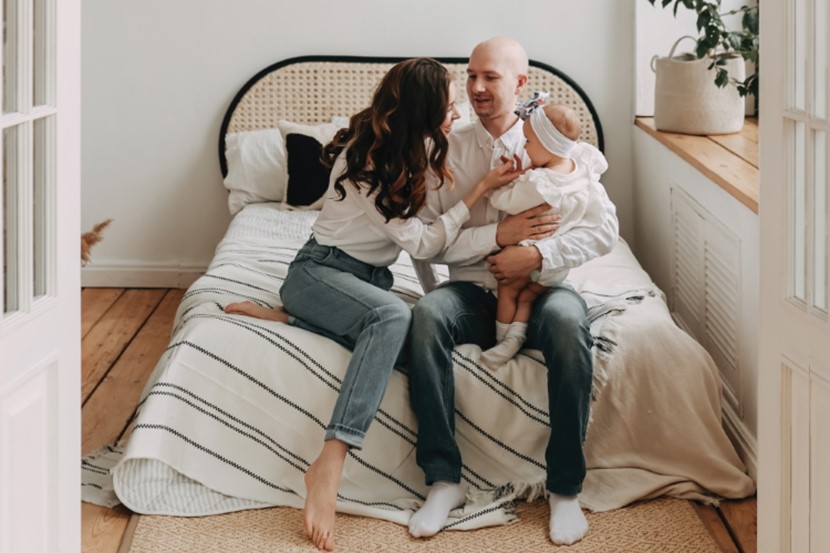
Thinking of diving back into the workforce after having a baby? Or choosing to be a stay-at-home parent? Hazel Squair explains how co-parenting their daughter is giving her and her partner the best of both worlds.
Whenever I say that my partner and I are co-parenting, I notice people tend to cringe. And I get it – it's a term that most of us first encountered (and rolled our eyes at) during Gwyneth and Chris' cringingly-mindful "conscious uncoupling" back in 2016. It's not something you often hear from regular non-Hollywood parents, particularly those who are still together.
For most nuclear families, one parent (usually the mum) takes on the role of primary stay-at-home caregiver, while the other (usually the dad), takes the role of the primary breadwinner. Simple. However, we are now seeing a small but growing number of families flip the gender norms and have dads take on this home caregiving role while women head back to climb the corporate ladder – and this is great, but what if it didn't have to be so either/or?
CO-PARENTING
What if both parents were able to contribute to the breadwinning and the child-rearing equally?
Phrases like 'shared parenting' and 'co-parenting' tend to make us think of split families. But, the term co-parenting, which popped up in the lexicon of social theorists around 1970, was initially used to describe a style of shared earning/shared child-raising within the context of a cohabitating nuclear family.
In the 2011 book Coparenting: a Conceptual and Clinical Examination of Family Systems, researchers define co-parenting as an "enterprise undertaken by parents who together take on the socialisation, care, and upbringing of children for whom they share equal responsibility." To put it plainly, it's a shared earnings/shared parenting partnership where both parents identify as primary parents while also taking responsibility for making a substantial contribution to the family's income.
Because earnings levels can vary, being equally responsible for earning doesn't mean that you necessarily will bring in the same amount. The critical thing is that each parent is considered a core earner in the family, as well as a core carer.
FINDING THE RIGHT BALANCE
Early on, breastfeeding meant that I was naturally more tied to our daughter, Andie. I was however, able to work from home and my partner, Giacomo, dropped a day at work to help more with caring for her and keeping our house in order.
Now, two years in, we have a more even split. Giac and I work three or four days per week each, depending on rosters (for him) and workload (for me). Andie is at daycare for two days, and then she has two days at home with each of us. And we have at least one full day where all three of us are home together.
It's a schedule that maximises our earning ability while making sure we both have solo time with Andie and shared family time. And, while there's not as much room for Giac and me to have our own time together, I know that things will rearrange again once Andie starts kindy next year.
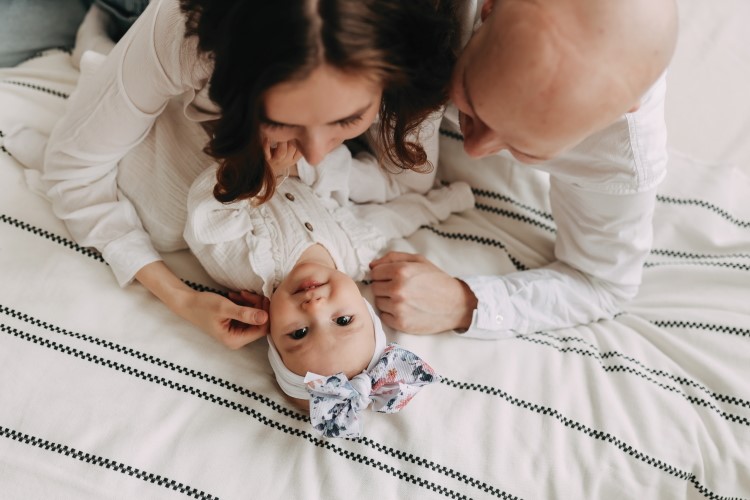
THE PRACTICAL SIDE
We hadn't planned to have a baby (surprise!) and couldn't afford to live solely on Giac's income. I earn more than he does, but I wasn't prepared to go out to work full-time and have him as a stay-at-home dad. So, finding a way for both of us to work and care for Andie seemed like the best solution.
However practical it was, though, I'm well aware that co-parenting would never have been an option for us if it didn't align with our philosophies and values.
Both Giac and I like to buck the traditional gender roles where we can. I had never had intense maternal yearnings or fantasised about being a stay-at-home mum. In fact, the whole idea terrified me. And for Giac, who grew up wishing for more connection with his own father, being hands-on involved with his daughter from day one has been powerfully cathartic.
We never researched shared parenting styles and didn't set out to subscribe to a particular model as such. It was more about creating something that was right for us. But now, two years in, I realise how perfectly suited this style of parenting is to us – and we likely would have chosen to do it this way, even if we hadn't needed to for practical reasons.
EQUAL, YET INDIVIDUAL
It's important to note that co-parenting doesn't mean one homogenous parenting style – each parent is still very much an individual.
Both parents identify as equally responsible for the child's wellbeing and the success of their upbringing, not just in terms of providing financially, but personally and developmentally. But the ways they go about things might be quite different.
Giac and I share the same foundational parenting values, but we parent in our unique ways. Andie's relationship with her dad is different from the one she has with me. He's more physically playful, they get messy together, he likes to get creative with mealtimes, and they spend a lot of time outdoors. I prefer a bit more routine; I love reading with Andie, bath times, doing puzzles and singing.
According to the author of Strong Fathers, Strong Daughters, Dr Meg Meeker, "Dads approach parenting with different priorities than we mothers do. They tend to care less about dress, eating habits, and other details. Instead, dads tend to want to play with kids more and challenge them more, and this can help kids gain confidence."
This example might not resonate with everyone, but men and women do tend to bring different things to the parenting table. And it's definitely true in our home. The non-parenting stuff we do during our days at home tends to be different, too. For example, I often try to get through some work while Andie plays or naps, whereas Giac takes care of more of the household chores and loves cooking (lucky me!).
THE BENEFITS
For starters, it's led to a truly collaborative partnership between Giac and me. Because we are both equally involved with Andie, we both share the thinking work around her wellbeing. It's never falling on just one of us. We share notes and troubleshoot together. We take advice from each other. As such, we've grown stronger as a team. Where many couples might find the arrival of their first baby a bit of a dividing moment, it's drawn us closer together.
It's given us healthy respect and empathy for each other's position. We both know what it's like to come home after a hectic day at work and walk into a messy house and a screaming kid. And, we both know what it's like being the one at home all day in that messy house with the screaming kid, too.
For me, it's meant being able to maintain a little of my pre-mama life. I still get to work, which is important to me. I get to have days out of the house at a co-working space, get to meet friends for coffee or lunch. And, I still get to have a significant amount of quality time with Andie.
And Giacomo loves it, too. He gets to work part-time in a busy cafe, flexing his social muscles while making a valuable contribution to our income. He also gets to have his days at home with Andie (which he likes to refer to as their "days off together" – cute!), he gets to cook fun things and do lots of work in the garden.
Perhaps most of all, I love how this co-parenting model has enabled Andie to develop equally strong relationships with both of us. I feel such immense pride watching Andie and Giac together – they have such a special bond, and it doesn't take anything away from my relationship with her. As the saying goes, there's no limit to how much your heart can hold.
I also love knowing that she's watching and learning from us about true partnership and that anyone – whether it's Mum or Dad – can do the laundry, cook, change nappies or go to work.
THE CHALLENGES
Keeping everything running smoothly requires careful coordination and constant communication. We're always checking in with each other to see where we're at with laundry or how many bananas Andie has had today (usually too many).
Given that our shared parenting style isn't the norm, we often find ourselves coming up against other people's assumptions. Giac has to deal with people assuming that he's just on 'daddy daycare' – he gets told he's "doing so well!" and is congratulated for the simplest tasks... like whoever heard of a man changing a nappy at the pub? We also find that people tend to wait till I'm there to have essential conversations about Andie – whether it's the doctor, the Plunket nurse or the daycare teachers. This 'mum is boss' mentality undermines Giac's role and is unnecessary because he's as much an expert about everything to do with Andie as I am!
TEAM WORK
Aiming for a real division of responsibility requires an ongoing commitment. One day is never the same as the next, so we both need to be open to picking up the slack. Giac might have a cruisy day at home with Andie and get more housework done, or I might have a big project on and need to do a longer day at my computer. Keeping things feeling harmonious and healthy means we both have to be mindful of not scorekeeping (such an easy trap to get into!) and keeping our eyes on the bigger picture of balance. We have to be adaptable to the ebbs and flows and to check in with each other to readjust our loads when we need to.
The biggest piece of advice I would give to other parents interested in co-parenting would be to get comfortable with things not necessarily being done the way you would do them. We all know that kids need consistency, so set the ground rules early around the things you really care about being done in a certain way – it might be meal times, nap schedules or TV use. Once those things are established, step back and let each parent do their thing in their own way.
Yes, this requires a fair bit of holding your tongue and swallowing back the "I would have done it this way". When Giac turns up with Andie to meet me for a coffee and she's wearing the most bizarre and impractical combination of clothes – I say nothing. When I get home from work to find Andie's hair a wild, Tarzan mess of fruit pulp – I make a mental note to wash her hair out in the bath tonight, and I say nothing.
It takes a bit of practise, but you have to let the small stuff go to demonstrate trust in each other's parenting. Because without that, it'll never work. Co-parenting isn't about one parent setting the rules and the other complying – it's about both parents having the confidence to make decisions and take responsibility. And that's a partnership that's worth its weight in gold.
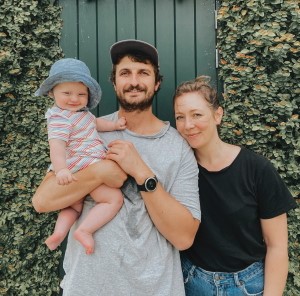
Hazel is a freelance copywriter who lives in Raglan with her partner Giacomo, two-year-old daughter Andie, and very naughty border collie, Bernie.
Article photography: @lizaastark via Twenty20

AS FEATURED IN ISSUE 54 OF OHbaby! MAGAZINE. CHECK OUT OTHER ARTICLES IN THIS ISSUE BELOW
